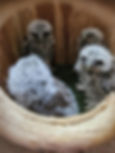Brown Pelican Crisis Update
- Jul 11, 2024
- 3 min read

It was just two months ago that hundreds of starving Brown Pelicans began showing up in the most unlikely places. Scientists now have a theory about what might be to blame, and it's climate related. Late spring storms hitting the coast brought high winds, choppy seas and poor visibility, which combined, kept the pelicans from reaching the fish below the surface.
Taking the brunt of the impact has been our sister organization, International Bird Rescue Center (IBRRC) in Fairfield that specializes in waterbirds. Under their care, the first pelicans have already been returned to the wild! Though pelican intakes have recently waned, there are still many in their care, leaving IBRRC unavailable as a resource for our local W. Ninth Street herons and egrets.
Thanks to you, BRC immediately created on-site spaces to provide longer-term care for the hundreds of birds rescued from the rookery in downtown Santa Rosa.

There’s no question these extra mouths to feed have meant extra work for staff and volunteers. And even though this unexpected crisis hit during our busiest time of year, our staff, volunteers, supporters, and fellow wildlife organizations yet again rose to the challenge. Thanks to them, we have been able to provide each waterbird we received with the care needed in order to regain their strength and health and return to the wild!
Teeny Tiny Baby Owls!!

Four baby owls, so young their eyes had barely opened, arrived from Healdsburg June 5th after their nest tree partially collapsed. While the babies weren’t harmed in the incident, they had lost their home and were turned into BRC.
Without adult feathers to help identify their species, we knew they were small owls—but what kind of owl?

The babies were so young they each still had their "egg tooth", a small hard structure on the tip of the beak. Baby birds still safely encased in their shells use the egg tooth to break through the shell and become a part of the broader world. The egg tooth falls off within a few days of hatching, so we knew these babies were among the most vulnerable of all--mere days old. Every precaution was taken to prevent imprinting, including using a disguise to mask all human features.
Most babies we treat are diurnal, meaning they are active during the day and sleep at night. This allows our staff and volunteers to do the same. Not so with nocturnal species. With nocturnal species, caregivers must become nocturnal, and being so young, these babies needed to be fed every two hours.
The first night told us a lot about these tiny ones. There are only so many small owl species in the area and the most common are Western Screech Owls. Our natural assumption, therefore, given their size and age, was that these were tiny "screechies".
Just three days later, our “nocturnal caregivers” confirmed that they were not the only ones struggling to stay alert at night! As it turns out, the babies were not a nocturnal owl species. We also now had some plumage development and based on that plus the babies' weight progression, we were able to more accurately compare these little ones to other known owl species. They were not Screech Owls...

Our guests were Northern Pygmy Owls! These are the smallest species of owls in our area and being baby Pygmy Owls, quite possibly the smallest owls we've ever had at the Center in our entire history!
These little ones are progressing by leaps and bounds each day. They were eating on their own by day five and soon started the transition to outdoor enclosures. Since their parents were no longer in the area, the little orphans are now at a host site where they are on a path to becoming self-reliant. This process for raptors, known as "hacking", allows them to gradually adjust to their new environment. Once their hack box is opened, they can come and go as they begin life's journey, supported by daily feedings and a safe place until such time as they are completely independent and able to fend for themselves.
A huge thank you to our volunteer host family for opening up their land, their hearts, and being involved in the progress of these young owls.
Live long and live well, little ones!
While Baby Bird Season tests our endurance, stories like those above bring such a sense of fulfillment. But none of this would be possible without the ongoing support from all of you!
Your donations of time, talent and resources have made a lasting, positive impact on our local avian populations. You make this work possible. You save lives.
We sincerely thank you for your involvement and support.
Donate online using the button above, or mail your check to:
The Bird Rescue Center
PO Box 475
Santa Rosa, CA 95402
